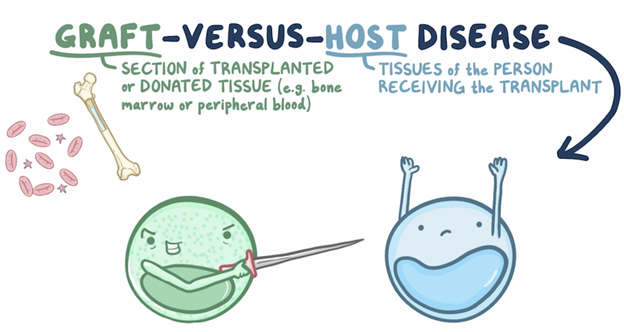A kidney transplant recipient stops immunosuppressive therapy three years after his surgery. Shortly after stopping therapy, he demonstrated clinical manifestations of kidney failure. Which type of reaction does this represent?
Cushing's syndrome
Hypersensitivity reaction Type I
Chronic graft versus host rejection
Acute host versus graft rejection
The Correct Answer is D
A. Cushing's Syndrome: This is a condition caused by prolonged exposure to high levels of cortisol, a hormone produced by the adrenal glands. It is not related to kidney transplant or immunosuppressive therapy.
B. Hypersensitivity Reaction Type I: Also known as an immediate hypersensitivity reaction or an allergy, this type of reaction involves the immune system's exaggerated response to an allergen. Symptoms can range from mild to severe and occur quickly after exposure to the allergen. While allergies can cause various symptoms, they do not specifically represent rejection of a transplanted organ.
C. Chronic Graft Versus Host Rejection: This term is commonly associated with bone marrow or stem cell transplants. It occurs when immune cells from the donated tissue recognize the recipient's body as foreign and attack various organs or tissues. This process typically happens over a more extended period and is not directly related to the scenario described.
D. Acute Host Versus Graft Rejection: This occurs when the recipient's immune system recognizes the transplanted organ as foreign and launches an immune response against it. It can happen shortly after transplantation if the recipient's immune system is not adequately suppressed. In this case, stopping immunosuppressive therapy can trigger acute rejection, leading to the failure of the transplanted organ.

Nursing Test Bank
Naxlex Comprehensive Predictor Exams
Related Questions
Correct Answer is D
Explanation
A. Reddened tongue and gums: This side effect is not typically associated with ampicillin. However, certain medications or medical conditions can cause changes in oral tissues, leading to redness in the tongue and gums.
B. Digit numbness and tingling: Ampicillin does not commonly cause numbness and tingling in the fingers and toes. These symptoms can be associated with neurological issues or circulatory problems.
C. Bruising and petechiae: These symptoms can indicate bleeding disorders or low platelet count and are not usually caused by ampicillin. It's essential to investigate further if a patient experiences unexplained bruising or petechiae.
D. Skin rash and loose stools: Skin rash is a known side effect of penicillin-type antibiotics, including ampicillin. Loose stools or diarrhea can also occur due to disruption of the gut flora caused by the antibiotic. Patients should be aware of these possibilities and report any severe or persistent symptoms to their healthcare provider.
Correct Answer is B
Explanation
A. "You have developed urticaria in response to something in your environment."
This statement is incorrect. Urticaria refers to hives, a skin rash usually caused by an allergic reaction, infection, or stress. It's not necessarily indicative of an autoimmune disease.
B. "Your immune system is creating antibodies that are destroying your own cells."
This statement is correct. Autoimmune diseases involve the immune system mistakenly attacking the body's own cells and tissues, leading to various health issues.
C. "Your immune system is not able to create antibodies to help you fight infection."
This statement is incorrect. In autoimmune diseases, the immune system is overactive, producing antibodies that target the body's own cells, not that it can't create antibodies.
D. "You have developed an infection that is destroying your immune cells."
This statement is incorrect. Infections don't typically destroy immune cells; instead, infections often stimulate the immune system to respond and fight against invading pathogens.
Whether you are a student looking to ace your exams or a practicing nurse seeking to enhance your expertise , our nursing education contents will empower you with the confidence and competence to make a difference in the lives of patients and become a respected leader in the healthcare field.
Visit Naxlex, invest in your future and unlock endless possibilities with our unparalleled nursing education contents today
Report Wrong Answer on the Current Question
Do you disagree with the answer? If yes, what is your expected answer? Explain.
Kindly be descriptive with the issue you are facing.
